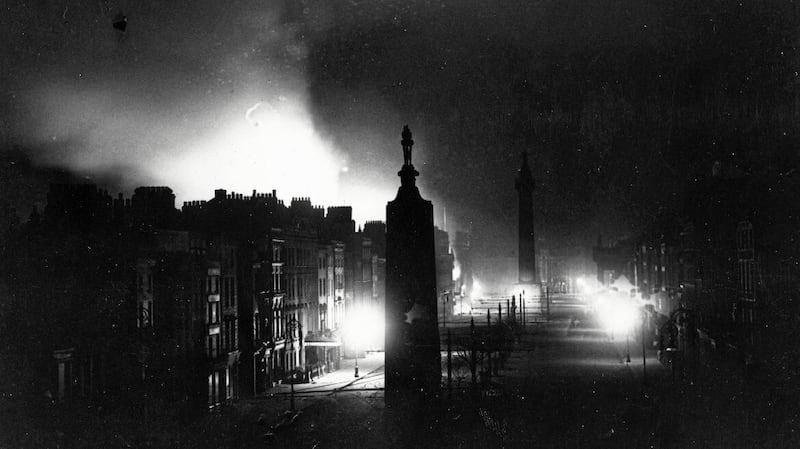Today is the centenary of the first meeting of the Irish Boundary Commission, which met in London on the first Friday of November 1924.
Established under Article 12 of the Anglo-Irish Treaty in 1921, it was delayed, first by the Civil War which ended in May 1923, and then by changes of government in Britain.
Another cause of delay was the refusal of Sir James Craig, the north’s prime minister, to appoint a commissioner. Craig also refused to make any submission to the body.
♦ Subscriber exclusive: Q&A with columnist Tom Kelly
The British government had to step in and appoint a representative for the north. They chose Joseph Fisher, barrister and former editor of the Northern Whig, a Belfast-based pro-union newspaper.
The chair was Justice Richard Feetham, who was born and raised in Britain but was legal adviser to the High Commissioner for South Africa.
Dr Eoin MacNeill represented the Free State, an unfortunate choice for, although he was high-minded, held strong principles and had considerable achievements to his name, he was of an academic bent and some would say other-worldly.
He was politically clueless. On the Boundary Commission he was an abject failure, never making the case for extensive land transfers to the Free State.
MacNeill was chosen because, as a northerner, he was the only member of the Executive Council of the Free State who was deemed to have any knowledge of the issues at stake.
However, apart from his lack of political nous, the fact that he was also Minister of Education meant he couldn’t devote his full attention to the Boundary Commission.
Born in 1867, MacNeill was from Glenarm. He had been a pupil at St Malachy’s College on Belfast’s Antrim Road, where he boarded from 1881-87.

At the top of the drive to the college’s main building you can see an Ulster History Circle blue plaque to MacNeill. The plaque is on the wall just below the room where he boarded. It was unveiled on the 150th anniversary of MacNeill’s birth in 2017 by his grandson, Senator, and former Tánaiste, Michael McDowell.
Speaking at the occasion, Senator McDowell said St Malachy’s was “the making” of his grandfather. He added: “He was really very, very fond of this institution and he was somebody who, after he ceased to be a pupil, kept very close ties with St Malachy’s. There is no doubt that it was the education he received here which set him on his career and changed Irish history.”

Unfortunately, political science was not one of the subjects MacNeill studied. He was foremost in the revival of the Irish language, founding the Gaelic League with Douglas Hyde and becoming a professor of Irish history.
In 1913, MacNeill’s article ‘The North Began’, in An Claidheamh Soluis, was the inspiration behind the establishment of the Irish Volunteers as a challenge to the UVF.
Despite being chief of staff of the Volunteers, MacNeill never realised that the Irish Republican Brotherhood (IRB) and its military council had captured the organisation from under his nose. He only discovered that had happened the night before the Rising and issued the infamous ‘countermand’ to try to stop the Rising.

It was delayed in Dublin but MacNeill’s intervention wrecked it in the rest of the country.
The IRB were incandescent. The day before he was executed, Tom Clarke, who had organised the Rising with Seán MacDiarmada, told his wife: “I want you to see to it that our people know of his treachery to us. He must never be allowed back into the national life of this country, for so sure as he is, so sure will he act treacherously in a crisis. He is a weak man, but I know every effort will be made to whitewash him.”
Clarke was right. In 1924, MacNeill was once again in a critical position to influence Irish history. With his weakness and high-minded dottiness, he remained passive while fellow commissioner Fisher leaked details of the commission’s work to unionists and MPs.

MacNeill allowed Feetham to control proceedings. He never presented the clear negotiating instructions WT Cosgrave, President of the Executive Council, gave him. Furthermore, MacNeill adhered rigidly to the commission’s confidentiality rule, which the other members blithely ignored.
Incredibly, MacNeill didn’t even inform Cosgrave of the commission’s plans.
The Executive Council were therefore stunned when the findings were leaked. MacNeill knew he’d made a mess of his responsibilities. He resigned and, too late, openly accepted he was the wrong man for the task.
Too late also for northern nationalists whose high hopes of the commission were utterly dashed.
- Cormac Moore: How the ‘third man’ on the Boundary Commission 100 years ago helped secure the border for unionismOpens in new window
- Cormac Moore: Was Eoin MacNeill to blame for Boundary Commission's 'disastrous' outcome?Opens in new window
- Cormac Moore: Fake news and the battle over the Irish borderOpens in new window




